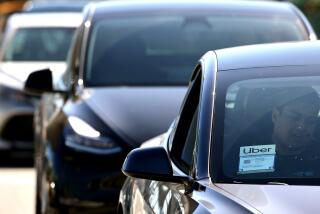Victim’s Family Hopes Court Will Make Bar Pay for Death
- Share via
Refused a drink at three other bars because he was so intoxicated, Steven Chase found a friendly bartender at a popular Newport Beach nightspot on March 10, 1985.
After downing a few vodkas and soda and finally reaching a point where he was denied service, Chase was out on the road--with tragic results: His pickup rammed the bicycle of 20-year-old Joey Howe. And the cyclist became only the latest casualty among 40,000 people killed each year by drunk drivers.
Chase, captured 3 hours later by police with a blood-alcohol level estimated at three times the legal limit, had his day in court. He pleaded guilty to vehicular manslaughter charges and was sentenced to 16 months in prison for a crime that the victim’s father said left his family “condemned to a lifetime of sadness.”
But Joey Howe’s parents claim that another guilty party in the accident--Woody’s Wharf, the bar that served alcohol to an allegedly obviously drunk patron--escaped punishment.
The family, confronted with a stringent state law that made suing the bar virtually impossible, has struck out in three tries in state courts to hold the bar partly liable for the accident.
Now, the Howes are down to their last chance--the U.S. Supreme Court--and could, within the next several weeks or months, have a decision that carries potentially broad implications for the state’s liquor liability laws.
“This is a vital case, and we’re keeping a close eye on it,” Micky Sadoff, national president of Mothers Against Drunk Driving, said in a telephone interview from the group’s Texas headquarters.
“Once and for all,” Sadoff said, “we have the chance to establish that these bars have to show a greater level of care than some have been and that they can’t just send people out into the streets and forget about them.”
But on the other side, liquor industry advocates argue that “dram-shop” laws--as liquor liability measures in other states are often known--hold bars and restaurants to an unreasonable burden of responsibility for their patrons and do little or nothing to keep drunk drivers off the roads.
“If they aren’t going to get their alcohol at a restaurant or a bar, they’re going to get it at the grocery store or somewhere else,” said Jo-Linda Thompson, director of government affairs and general counsel for the 2,700-member California Restaurant Assn.
Thompson said that while more bars and restaurants are now voluntarily training their employees to recognize patrons with problems, “ultimately, there’s nobody responsible for the drunk driver but the drunk driver. I don’t think we can expect other people to be their baby-sitters.”
Lawyers for both sides say the case represents the first time that the nation’s highest court will weigh the constitutionality of a question that has taken on even greater potency in a time of heightened public alarm over drunk driving:
Should an alcohol server--be it bartender or the host of a private party--be held liable for civil damages that could total millions of dollars if the server gives alcohol irresponsibly to a person who is then involved in a drunk-driving accident?
California, in the face of a general nationwide trend this decade toward establishing liability for irresponsible servers, is one of only a few states to maintain a broad immunity in this area, according to experts in the field. State law, with few exceptions, effectively shields both social and professional alcohol servers from being sued by those harmed in drunk-driving accidents.
Ironically, the 1978 state legislation authorizing that protection had its roots in several earlier California court rulings that penalized commercial liquor vendors and non-commercial hosts of parties.
As a result of these costly rulings, liability insurance for bars and restaurants skyrocketed, sending shock waves through the industry. And insurance companies brought the point home to state lawmakers by increasing the rates charged to political campaigns for fund-raising events where liquor is served. The bill giving broad immunity to alcohol servers soon followed.
Several efforts since then to repeal that immunity in the state Legislature have failed. Once again, a bill is pending in the state Assembly that would make alcohol servers subject to civil liability and would also seek to promote safe-serving practices at bars.
This time, however, the increased visibility of the drunk-driving issue and changes in the makeup of the Assembly Judiciary Committee make sponsors more optimistic than in past years about the measure’s chances for success, the sponsor, Terry Friedman (D-Los Angeles), said in an interview.
Nonetheless, many “dram-shop” law promoters--so named after 19th-Century temperence advocates who wanted to shut down saloons, or “dram shops”--see their best hopes for success in California not in the legislative arena, but in the courts.
The Howes’ Supreme Court appeal “is a case that the bar owners are worried about,” said James F. Mosher, a legal specialist in the field with the Marin Institute for the Prevention of Alcohol and Other Drug Problems. He is the author of a model law imposing liability of servers that has been adopted by several states.
Mosher, noting a study he worked on that found half of all drunk drivers had been drinking in bars, said in an interview that “dram-shop” laws making alcohol servers accountable for their patrons have proven sobering in helping keep drinkers off the road.
In most states, including California, bars are subject to misdemeanor criminal prosecution for serving obviously intoxicated people. But a more potent weapon for promoting responsible serving practices, Mosher said, is the threat of astronomical damages--such as a $10-million settlement gained a few years ago by the Florida survivors of drunk-driving victims.
“The best way to get a bar owner’s attention is through these lawsuits. This causes a tremendous amount of concern and anxiety on their part,” Mosher said.
In the suit now pending before the U.S. Supreme Court, the Howes challenge California’s immunity for liquor servers on the grounds of equal protection and due process, arguing in part that state law discriminates on the basis of age.
Under California’s immunity statute, an exception is made in the case of a bar or host that serves an obviously intoxicated minor.
Rees conceded in an interview that the Howes’ appeal to the Supreme Court is a “long shot,” but added, “we feel strongly about the correctness of our position.”
Indeed, the attorney representing Woody’s Wharf in the suit said he was somewhat surprised and concerned last month when the Supreme Court asked him for a response to a part of Rees’ argument, a potential sign that the court finds some credence in the plaintiff’s position.
“Certainly the case law supports our position, and it would take a rather dramatic change in the existing law for the plaintiffs to win,” said the defense attorney, Ellis Horvitz of of Encino.
May Take a Closer Look
“But you never know, since the Supreme Court has asked for a response (to the plaintiff’s jurisdictional statement by next month), this may be one that they want to take a closer look at. It looks to us like Mr. Rees has done a good job of getting the court’s attention. Now it’s our job to take it away.”
Should the Howes in fact succeed in their appeal, the most immediate impact would likely be a chance to finally have their civil suit heard, and evidence presented, in a trial court, attorneys said.
One person unworried by that prospect is Robert Kinney, a general manager at Woody’s Wharf who was tending bar the night of Howe’s death and is named as a co-defendant in the lawsuit.
“I feel we’re innocent,” said Kinney. “We did everything we could to ensure his safety and that of other people.”
Kinney, shocked to learn that Chase’s blood-alcohol level was about 0.30% at the time of the accident, said the case points up the difficulty of holding a bar responsible for the actions of its patrons.
Had he realized the extent of Chase’s drunkenness, Kinney said, “we would not have let him drive. There’s no way.
“You get 2 seconds to look at a guy and decide if he’s OK. That’s a difficult thing for a bartender to do. When someone walks in, a lot of times he’s been out in the fresh air, sobered up. And you really can’t tell.
“This guy Chase, he wasn’t slurring his speech. He walked in in a straight line, and he left the same way.”
More to Read
Sign up for Essential California
The most important California stories and recommendations in your inbox every morning.
You may occasionally receive promotional content from the Los Angeles Times.













